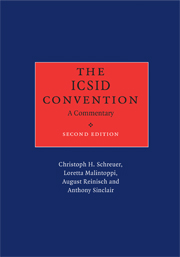Book contents
- Frontmatter
- Contents
- Foreword by Professor Sir Elihu Lauterpacht, CBE, QC
- Authors' preface to the second edition
- Table of cases
- List of abbreviations
- Text of the ICSID Convention
- Procedural calendar
- PREAMBLE
- CHAPTER I International Centre for Settlement of Investment Disputes
- CHAPTER II Jurisdiction of the Centre
- CHAPTER III Conciliation
- CHAPTER IV Arbitration
- CHAPTER V Replacement and Disqualification of Conciliators and Arbitrators
- CHAPTER VI Cost of Proceedings
- Article 59 Charges of the Centre
- Article 60 Fees and Expenses
- Article 61 Apportionment of Expenses
- CHAPTER VII Place of Proceedings
- CHAPTER VIII Disputes between Contracting States
- CHAPTER IX Amendment
- CHAPTER X Final Provisions
- Final Clause
- Consolidated bibliography
- Index by article
- Index by subject
Article 61 - Apportionment of Expenses
from CHAPTER VI - Cost of Proceedings
Published online by Cambridge University Press: 07 September 2010
- Frontmatter
- Contents
- Foreword by Professor Sir Elihu Lauterpacht, CBE, QC
- Authors' preface to the second edition
- Table of cases
- List of abbreviations
- Text of the ICSID Convention
- Procedural calendar
- PREAMBLE
- CHAPTER I International Centre for Settlement of Investment Disputes
- CHAPTER II Jurisdiction of the Centre
- CHAPTER III Conciliation
- CHAPTER IV Arbitration
- CHAPTER V Replacement and Disqualification of Conciliators and Arbitrators
- CHAPTER VI Cost of Proceedings
- Article 59 Charges of the Centre
- Article 60 Fees and Expenses
- Article 61 Apportionment of Expenses
- CHAPTER VII Place of Proceedings
- CHAPTER VIII Disputes between Contracting States
- CHAPTER IX Amendment
- CHAPTER X Final Provisions
- Final Clause
- Consolidated bibliography
- Index by article
- Index by subject
Summary
INTRODUCTION
Art. 61 is the last of the three Articles in the Convention's Chapter VI on “Cost of Proceedings”. Art. 61 deals with the apportionment of the costs of proceedings between the parties. These costs consist of the charges payable to the Centre, the fees and expenses of conciliators or arbitrators and the expenses incurred by the parties themselves (see Art. 59, para. 2). Other documents governing international arbitration also offer rules on the istribution of costs between the parties.
The drafts leading to the Convention's provision on the apportionment of costs underwent considerable changes. Initially, the provisions on costs were phrased in identical terms for conciliation and arbitration (History, Vol. I, pp. 272, 274, 276). After some debate, a more differentiated solution was adopted. In the case of conciliation, the original formula was retained, subject to certain adjustments, and found entry into the Convention (see para. 6 infra).
Art. 61 contains several factors determining the apportionment of costs. In conciliation proceedings, the costs will always be borne in accordance with the formula contained in Art. 61(1) (see paras. 5–7 infra). In arbitration proceedings, the parties may agree on the distribution of costs (see paras. 8–14 infra). If there is no such agreement, the tribunal is given discretion to make a decision on the issue.
- Type
- Chapter
- Information
- The ICSID ConventionA Commentary, pp. 1223 - 1243Publisher: Cambridge University PressPrint publication year: 2009



